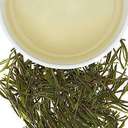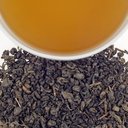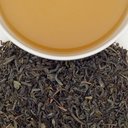Anji Baicha
 |
|
Commercial Description
This an ancient tea that has been rediscovered and made into one of the most sought after green teas in China. It is loaded with asparagus and citrus flavors.
Ratings & Reviews
Page 1 of 1 page with 1 review
 86 Aroma: 8/10 Flavor: 4/5 Value: 3/5
86 Aroma: 8/10 Flavor: 4/5 Value: 3/5Alex Zorach (1453 reviews) on May. 31st, 2017
I have read about Anji Baicha for years now, and this is the first time I've ever tried it. I've been very curious about it, especially since I've read that it's among the teas highest in L-theanine, but is prepared rather differently from Gyokuro, the tea I've tried that is also highest in theanine. It didn't quite wow me, but I liked it. I do see a slight resemblance to Gyokuro, but overall I found it more like other Chinese teas, and much easier to appreciate and enjoy.
Dry leaf smells beautiful, fresh, grassy, and toasty, with notes of grain or bread. The smell suggests a sweet and savory flavor.
As leaves hit the water the smell shifts and smells less sweet, and there's a surprisingly strong minty or wintergreen note. The aroma is also a little soapy, but this quality vanishes as I drink it, and is never unpleasant.
The tea liquor is incredibly light, almost colorless unless you pour it in a pristine white cup. Flavor is mild, surprisingly sweet, and lightly savory. Yet, in spite of the light color, the tea is surprisingly full-bodied, with a pleasant astringency.
Resteeps very well. I suspect you could get three steeps, especially if you kept the first one short (1-2 min?), but I preferred two with longer steeps. I was told to be cautious on brewing temperature, making sure it's quite low, but as an experiment I did edge the brewing temperature up a little, and outside of a slightly metallic taste, the tea tasted perfectly drinkable. It was definitely better with lower temperature water though. Overall, this tea was much more forgiving than Gyokuro, which I think would make me prefer it.
I liked how I felt after drinking this. It is incredibly mild and I noticed no noticeable caffeine kick, but I found it relaxing and helped me focus more.
Is it worth the price? I don't know. This is a super high-end tea, $33 for two ounces, $5 for just enough for 3 cups. I'm glad I tried it, but I think it's out of my price range, and I didn't enjoy it enough to justify spending this kind of money.
Page 1 of 1 page with 1 review
More Green Tea from China from Harney and Sons

Gunpowder Green
| Style: | Gunpowder Green Tea |
| Region: | Zhejiang, China |
| Caffeine: | Caffeinated |
| Leaf: | Loose |
1 Rating

Meijiawu Lung Ching
| Style: | Dragon Well (Long Jing) |
| Region: | Zhejiang, China |
| Caffeine: | Caffeinated |
| Leaf: | Loose |



